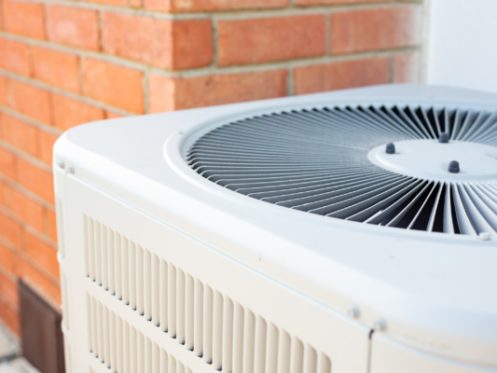Should You Cover Your HVAC Unit in the Winter?
Whether to cover your HVAC unit in the winter or leave it uncovered is a widely debated topic with valid arguments on both sides. One of the valid arguments for covering your HVAC unit is, “If they sell it, I must need it,” right? Well, not necessarily. Although personal preference will likely be the deciding factor in your decision to cover your HVAC unit or not, consider the following before making your decision.
Where Do You Live?
The climate where you live can play a significant role in your decision, but remember that no matter where you live, your HVAC unit needs ample airflow to function correctly and provide the years of service advertised. If you live in a warm climate, especially with high humidity, airflow is particularly important, especially in the summer months. If you opt for a cover and you live in a warm climate, a “carport” for your HVAC unit might be a good choice. A roof and four or more supports will provide shade and protection for the unit and prevent debris such as bird droppings from falling on it while still allowing ample airflow.
It can also provide marginal support from tree limbs, airborne objects in a windstorm, and so forth. However, the cover should have at least 12 to 15 inches of clearance on all sides and the top to facilitate maintenance and repair.
If you live where snow and ice are factors, then a more enclosed cover can provide protection from critters looking for a place to stay that’s out of the elements. However, it should still have ample clearance to allow for maintenance and repairs. You’ll also need to seal parts of the structure, so it doesn’t become a haven for spider webs and other types of multi-legged insects, especially wasps, in the summer.
Which Type of Covers Work Best?
Although they’re very popular, cloth and plastic covers aren’t the best options for covering your air conditioner, whether you have a window mount or a standalone unit. Cloth covers allow the buildup of moisture inside the unit, and you may develop a mold problem inside it. As a result, you might require the expensive services of a mold remediation company to eliminate the ensuing health hazard to your family.
Are There Problems With HVAC Covers?
An HVAC cover can protect your unit from small pieces of debris, such as leaves, small branches, icicles, and so forth. However, depending on the type of HVAC cover you select, you may generate additional problems by using one. Cloth and plastic covers are notorious for some of the issues they can cause. Other types may cause fewer problems but may be more labor-intensive to install and remove.
Cloth and plastic covers can trap moisture inside, which can cause the components to rust and corrode, ultimately reducing the unit’s lifespan. Since HVAC units are built to withstand the rigors of an outdoor installation, covering them isn’t always advisable. This is particularly true of covers that are strapped onto the unit and allow little to no airflow. If your unit is covered in this manner and you accidentally turn it on while covered, you can cause the entire unit to fail in very little time.
A piece of plywood cut to fit and placed on top of the unit or erected with legs, as described above, can be the best protection for your HVAC unit during cold weather. However, be aware that gusty winds can lift an unsecured piece of plywood and turn it into a giant frisbee, so be sure to secure it.
Covering your outdoor HVAC unit can prevent twigs and leaves from getting blown into your unit during autumn weather. Since these types of organic materials can clog the drainage system and obstruct fan blades, they may cause problems in the spring.
What About Window Units?
Window air conditioning units may have air gaps that let in cold air, and if you want to eliminate that problem, you may think that an air conditioning cover is a solution. It may prevent the cold air from entering your home, but a cloth or plastic cover may also cause the same problems with a window unit as they can with a standalone unit. Instead, use weatherstripping to eliminate drafts around the sides and install aluminum foil or a similar substance underneath the front grids to prevent cold air from entering through the vanes.
Is Your Covering for Aesthetic Purposes?
If you’re covering your outdoor HVAC unit simply for aesthetic reasons, then consider erecting a decorative screen around it that will hide the unit but not cover it. This will work well in any climate, and you don’t have to worry about adversely affecting the function of your HVAC unit or accidentally turning it on during cold weather.
Will a Cover Extend the Life of Your Unit?
The truth is that a cover may actually reduce both the lifespan of your unit and its efficiency. If your outdoor unit is covered with a plastic or cloth cover and you accidentally turn it on, you may cause it to fail entirely in a very short time due to a lack of airflow. Exterior units are designed to withstand outdoor hazards and work efficiently whether they’re in summer’s blazing temps or winter’s freezing weather. Your house is more susceptible to the rigors of weather than your HVAC unit.
If you use a plastic or cloth cover, the mold and moisture buildup may cause components to rust and corrode and fail more quickly than they otherwise would. If you live within 900 miles of a coastline, the salt content of the air may exacerbate the rust and corrosion factor. If you must install a cover on your exterior HVAC unit, then you’ll be money ahead to call a professional HVAC company for advice and recommendations.
Need a Professional Recommendation?
If you’re unsure whether you need an HVAC cover or about the best type of cover for your HVAC unit, then it’s best to get the advice of a professional. Not all recommendations are the same for all areas of the country, and it’s best to get a local professional opinion rather than rely on your instincts and your neighbor’s suggestions.
A local professional will be able to advise you on the best solution for your unit based on your location and climate. For example, what works best for someone on the East Coast where there’s high humidity and hurricanes may not work well at all for someone on the West Coast with its higher temps but lower humidity and lack of violent windstorms. When you call, consider scheduling a service call to make sure your unit is functioning at peak operation.
If you live in the Sacramento area and need heating, cooling, plumbing, or electrical home services, call Huft Home Services for more information. Our team specializes in HVAC maintenance and can help you save money on all your home comfort needs. To learn more about maximizing your energy needs while saving money, call Huft Home Services today.



